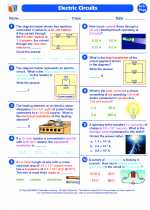Electric Circuits -> quantization of energy
Quantization of Energy
The quantization of energy refers to the concept that energy, in certain systems, can only exist in discrete, specific amounts or "quanta". This idea was first proposed by Max Planck in 1900, in his study of blackbody radiation, and is a fundamental concept in quantum mechanics.
Background
Before the development of quantum mechanics, it was believed that energy could take on any value and was continuous. However, observations of certain physical phenomena, such as the photoelectric effect and atomic spectra, could not be explained by classical physics and required a new approach. This led to the development of quantum mechanics, where energy is quantized and can only exist in specific multiples of a fundamental unit.
Quantum States and Energy Levels
In quantum mechanics, physical systems can only occupy certain discrete energy levels. For example, in an atom, the electrons can only exist in specific energy levels, and the transition of an electron from one level to another results in the emission or absorption of a specific amount of energy in the form of photons.
Planck's Constant
One of the key concepts in the quantization of energy is Planck's constant, denoted by h. This fundamental constant relates the energy of a system to the frequency of its associated wave. The energy of a quantum system is proportional to the frequency of the associated wave, and the constant of proportionality is Planck's constant.
Applications
The quantization of energy has profound implications in various areas of physics and technology. It is crucial for understanding the behavior of atomic and subatomic particles, as well as the development of technologies such as lasers, semiconductor devices, and quantum computing.
Study Guide
- Understand the concept of quantization of energy and its historical development.
- Learn about the significance of Planck's constant in quantization of energy.
- Explore the applications of quantization of energy in various fields of physics and technology.
- Practice solving problems related to energy quantization in atomic and subatomic systems.
- Study the experimental evidence and observations that led to the development of the concept of quantization of energy.
By mastering the concept of energy quantization, you will gain a deeper understanding of the behavior of physical systems at the quantum level and its impact on modern technology and research.
.◂Physics Worksheets and Study Guides High School. Electric Circuits

 Worksheet/Answer key
Worksheet/Answer key
 Worksheet/Answer key
Worksheet/Answer key
 Worksheet/Answer key
Worksheet/Answer key
